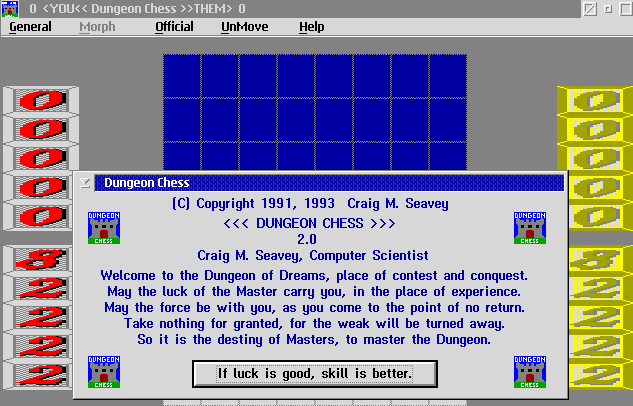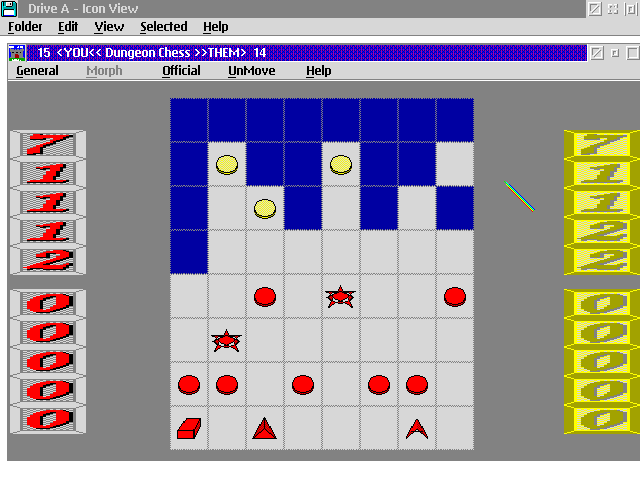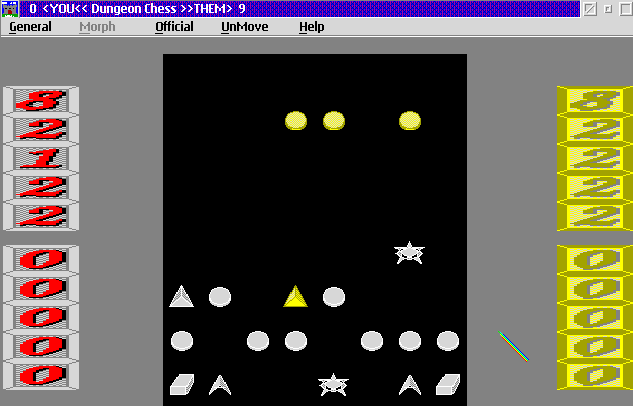| Type | Game |
|---|---|
| Date | 1993 |
| Platform |
|
| Tags | board game, chess |
Dungeon Chess
I promised to write about some more interesting OS/2 games, so here's one I thought was really neat: Dungeon Chess by Craig M. Seavey, Computer Scientist.

This one's a quite interesting variation on chess. I'll just quote the description I used on MobyGames here:
Dungeon Chess is a board game similar to Chess, played on an 8x8 board, called the dungeon. The player has access to sixteen weapons of five different types: eight Circs and two each of Arcs, Trigs, Rects, and Stars. Each weapon moves differently: Circs can move one room in any direction; Arcs move like knights in Chess; Trigs, like Chess bishops, move along diagonals; Rects, like Chess rooks, move along the rows and columns; and Stars, like Chess queens, can move any number of rooms either diagonally or along the rows and columns.
Circs and Trigs also have special abilities. Circs, like pawns in Chess, can be morphed into any other type of weapon upon reaching the opponent's home row. If a Trig is the last weapon available, it gains the ability to move like a Circ, so that it can access the whole dungeon.
When starting a new game, the player has the option of starting with an empty dungeon and placing his weapons manually when and where he chooses, or starting with the weapons already placed on the first two rows in a similar manner to the initial configuration of Chess pieces.
Dungeon Chess keeps score, but only as an indicator for how the game is going. The game is won when all the opponent's weapons have been captured--there is no checkmate in Dungeon Chess.
One major difference from Chess is that the player can only see those rooms of the dungeon which one of his weapons can access. If, for example, the player has only a Rect left, then only the row and column the Rect occupies will be visible--and the view will be blocked by any weapons that are in the way of movement.
Two game modes are offered: Master and GrandMaster. In Master mode, the grid of the dungeon is clearly marked and visible rooms are colored differently. In GrandMaster mode, the dungeon is solid black, and the rooms that are visible aren't marked, so the player must carefully inspect the positioning of the weapons to determine which rooms are definitely empty and which are simply out of view.

You can see in the above screenshot that there are three enemy Circs visible and a number of dark blue squares which may or may not contain enemy weapons, but which aren't visible to me. This makes the game quite difficult! I'm reminded of Stratego, where you don't know the rank of the enemy pieces until you attack them. The game of chess is quite different without perfect information.
Dungeon Chess is still sort of a parlour game, but it's much more interesting than the bland conversions of Connect Four and such that I've been seeing. It's a game that can only really work on a computer, since it wouldn't be practical to play it on physical boards. You could do it with two boards and a moderator, but it'd be a pain.
This is something I really like to see: doing things in computer games that wouldn't be possible for a physical game. For example, if you're playing a computer pinball game, why not have effects that couldn't be done on an electromechanical table? It can be done badly, of course, and there's something to be said for accurate simulation of real-world games and toys, but I like to see people exploring the possibilities.

GrandMaster mode is substantially harder, since the game doesn't indicate which rooms are visible. Frankly, I prefer Master mode--it's just too much trouble to work out which rooms are empty and which are just invisible, at least for me. Maybe some people who are more into strategy games would feel differently.
Dungeon Chess is single player, but it seems that it's based on a multiplayer (network) game called ChessNet. There's a chess game for Windows with that title from the right time period, but I think it's not the same one. I'd like to see the multiplayer version of this game--it ought to be great fun.
There is actually still a version of this game around. Behold the modern homepage of Dungeon Chess. From the description, I suspect the modern version is really a different (if similar) game from this old one. I'm not shelling out $15 to find out, though.
| Name | Role |
|---|---|
| Craig M. Seavey | Developer |